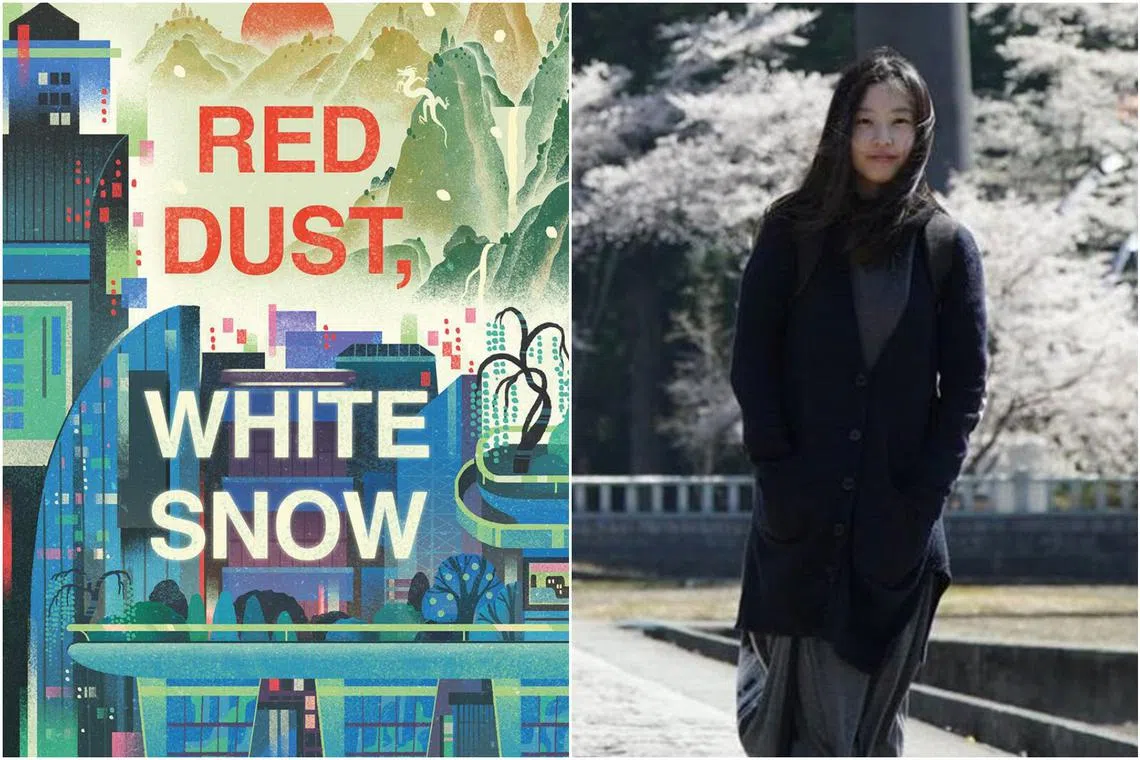Book review: Red Dust, White Snow struggles to balance philosophy and accessibility
Sign up now: Get ST's newsletters delivered to your inbox

Singaporean author Pan Huiting debuts with a lightly sci-fi novel, Red Dust, White Snow.
PHOTOS: COURTESY OF WENJIA TANG, PAN HUITING
Red Dust, White Snow
By Pan Huiting amzn.to/3Pa1vtU
Science fiction/Fairlight Books/Paperback/190 pages/$18.80/Amazon SG (
3 stars
Red Dust, White Snow features a lightly sci-fi setting of Singapore at an undisclosed point in the future. Its philosophical musings and writing style can both attract or repel readers.
Singaporean author Pan Huiting questions the meaning of dreams and reality in her debut novel, a different venture from her usual artistic medium of paintings. Her work has been exhibited in Singapore and London.
The narrative follows an unnamed female character who seems to be more an empty vessel for ideas than a fully fledged person.
Her monotonous routine is disrupted when a mysterious device appears and transports her to an alternate universe while she sleeps. The more time she spends there, the more the narrator has to decide what reality means to her.
She muses in very meta fashion: “If she were to write a novel about her life, it would be a novel with no side characters. The fleeting thoughts and feelings constituting a character’s stream of consciousness would instead be occupied by a steady stream of digital stimulation.”
The critiques about technological overdependence are timely and encourage personal reflection. Hiding behind the all-encompassing app Empi, the narrator lives a life more virtual than physical while lamenting her loneliness.
Her lack of real-life relationships leaves room for speculation whether this is the product of choice or circumstance.
The narrator’s turning down of invites from colleagues for meals and TV show watch parties in favour of spending time in front of a screen alone makes it almost too easy to judge her for not trying.
Simultaneously, it begs the question of how many people do that now.
The narrator says: “Nothing beats Empi at being a time killer. With Empi, one is never truly alone, except when asleep.”
This world feels like something out of an episode of British sci-fi show Black Mirror (2011 to present), albeit less dramatic and intense.
While the rules of the world are loosely established, they provide enough structure to make it seem like a possible future where a single app is all a person needs for entertainment, socialisation and sustenance.
For all its merits, the writing style lacks accessibility. While some may love the poetic ambiguity, others may find it pretentious or an overcomplication of a widely recognised problem of excessive screen time and social isolation.
A lack of quotation marks in the parallel universe also makes the dialogue confusing to follow, as it is not always clear if something is a thought or spoken sentence.
Without distinction between character voices, it sometimes feels as if everyone is the same person.
It is unclear what the narrator, devoid of conflict or a goal, ultimately seeks.
Her decisions to randomly spend large amounts of money and continuous choice to remain alone despite her colleagues’ efforts to include her make it difficult to empathise with her.
Yet, these decisions are a clear depiction of unintentional self-sabotage that some readers may connect with.
While the novel is well-meaning, the struggle to clearly define its message leaves the reader with the unfortunate feeling that it takes a more erudite mind to appreciate the story.
If you like this, read: Warcross by Marie Lu (G.P. Putnam’s Sons, 2017, $17.74, Amazon SG, go to amzn.to/3ECsidx
This article contains affiliate links. If you buy through these links, we may earn a small commission.



